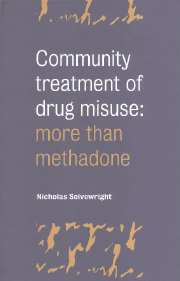Book contents
- Frontmatter
- Contents
- Foreword by Professor John Strang
- Preface and acknowledgements
- Introduction: community treatment in context
- Part I Treatments
- Part II Providing clinical services
- 5 Community drug services
- 6 Treatment of drug misuse in primary care
- 7 Balancing security and accessibility
- 8 Dual diagnosis – drug misuse and psychiatric disorder
- Epilogue Future directions
- Appendix 1 Protocols for quick detoxification from heroin
- Appendix 2 Opioid equivalent dosages
- Glossary
- References
- Index
7 - Balancing security and accessibility
Published online by Cambridge University Press: 17 August 2009
- Frontmatter
- Contents
- Foreword by Professor John Strang
- Preface and acknowledgements
- Introduction: community treatment in context
- Part I Treatments
- Part II Providing clinical services
- 5 Community drug services
- 6 Treatment of drug misuse in primary care
- 7 Balancing security and accessibility
- 8 Dual diagnosis – drug misuse and psychiatric disorder
- Epilogue Future directions
- Appendix 1 Protocols for quick detoxification from heroin
- Appendix 2 Opioid equivalent dosages
- Glossary
- References
- Index
Summary
Introduction
In community treatment of drug misuse at any level, there is an ever-present need to balance the safety and security of treatments against not only their general effectiveness but also their ability to attract and retain users on a significant scale. The issues relate most acutely to the prescribing of substitution treatments, given the risks inherent in this approach but also the proven ability of methadone in particular to encourage presentation to services. In recent years the harm-reduction and possible HIV-preventive benefits of methadone treatment have been emphasized, and services have placed a premium on accessibility and user-friendliness, with relaxation of the rules and regulations of treatment in many cases. This process, and issues of effectiveness, have been discussed in Chapter 1, but here we should examine the other side of the equation relating to safety, which is receiving increasing attention for various reasons, including medico-legal sensitivity.
The dilemma for those providing treatment services is as follows. Given the nature of drug misuse, and the nature of substitution treatments within drug misuse, a proportion of patients will manipulate the treatment system and abuse the medications, if given the chance. The only way to (virtually) eliminate such abuse, apart from the untenable position of avoiding such treatments altogether, is to require all patients to attend a dispensing centre every day for supervised consumption of methadone.
- Type
- Chapter
- Information
- Community Treatment of Drug MisuseMore than Methadone, pp. 176 - 189Publisher: Cambridge University PressPrint publication year: 1999



